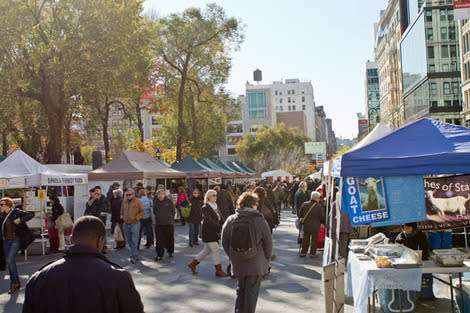Tips for Becoming a Locavore
For some, locavorism is a fad. But restaurants are continuing to adopt farm-to-table practices and new farmers markets seem to be popping up every weekend, so it doesn't seem as though the trend is going away anytime soon. That can be a good thing, and the basic tenets of locavorism are simple: Eat local, shop local, and grow your own food.
Click here for the 10 Tips for Becoming a Locavore Slideshow
"Eating locally can be simple," notes Jasia Steinmetz, author of the recently released Eat Local: Simple Steps to Enjoy Real, Healthy and Affordable Food. "Every time you can buy something that supports your local community and local food system, it'll have a big impact."
Click here to see How Healthy Your Kids' 'Healthy' Snacks Are
Locavores like Steinmetz believe buying local creates a sense of community, one between farmer and consumer, which has long been lost. Many restaurants tout the "farm-to-table" movement as a return to our roots, and some writers (like the influential Michael Pollan) point out that the food we call organic and sustainable was just "food" to our grandparents. It is a lifestyle that proponents say results in more flavorful food.
Click here to see America's Weirdest Cupcakes
Becoming a locavore does not necessarily require a drastic change in lifestyle. It does not require building a greenhouse, learning growth cycles, or raising your own chickens. It can be as simple as just being mindful and checking the labels on the food you're buying. "People are buying things by signage or display, but it may not be the best price or clearly marked," advised Steinmetz.
According to Steinmetz, being a locavore is - at its core - about "voting with your fork," whether that means adding a bit of locally produced food to each meal or asking questions of your local butcher or farmer. In the accompanying slideshow, the author provides 10 easy-to-follow tips on how to ease into locavorism. After all, the more you know about the origins of your food, the better.
Purchase Local Goods This Holiday Season
Celebrate local with holiday purchases from local farmers such as honey, maple syrup, nuts, etc. Be sure to add the name of the farmer and location, if possible.
Make Buying Local a Weekly Ritual
"Our weekend ritual includes a stop at our local bakery for the bread for the week," says Steinmetz. Find a ritual that supports a local food business and shop regularly.
Ask the Grocery Manager About Local Products
"The produce manager will be as responsive to you as possible. Managers pay attention to who is asking, what's being asked, and what people are asking for. They know their vendors and when products come in, and can give you the most useful advice," says Steinmetz.
Choose Brands Close to Home
Check the labels on the stocked shelf items of the grocery store to choose the brand closest to your home. "I recently found a mustard made in our state," says Steinmetz.
Order Local Items at Restaurants
Ask your local restaurant if they buy local food and congratulate them on their purchase, then try the menu item!
Meet a Farmer
"Farmers will feel supported. If someone cares enough to meet them, they'll provide a lot of background and knowledge about the produce consumers are buying. They're proud of their work and will often have tips on how to use their product more effectively."
Click here to see 4 More Tips for Becoming a Locavore
- Joseph Hernandez,The Daily Meal
More from The Daily Meal:
What's Really in Your Favorite Snacks?
America's Best Buffalo Wings
The Ultimate Food Lover's Gift Guide
25 Top Food Blogs of 2011
10 Most Fattening Fast-Food Dishes

